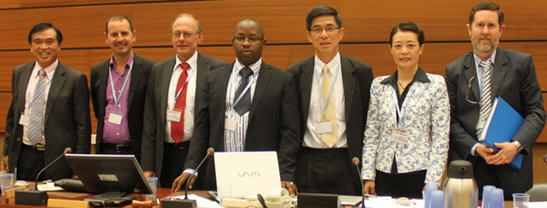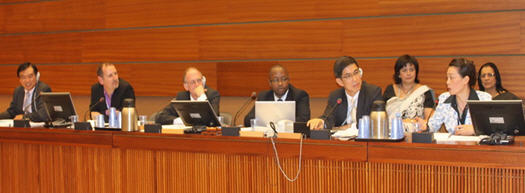Thailand together with China, Rawanda, Germany, Save the Children Fund and World Health Organization (WHO) discussed the movement towards universal health coverage at the side meeting of the 64th World Health Assembly (WHA) on 17 May 2011. The event provided a platform for experience sharing with international audience from countries with different GDP levels that has achieved, and/or striven toward universal health coverage.

| From far left: Dr. Winai Swasdiworn , Thailand; Mr. Simon Wright, Save the Children; Dr. Udo Sdholten, Germany; Rep of Rwanda; Dr. Suwit Wibulpolprasert, Thailand; Ms. Chen Nishan, China; and Mr. David Evans, WHO |
Moderated by Dr. Suwit Wibulpolprasert, Senior Advisor on Disease Control, Ministry of Public Health, Thailand, the meeting demonstrated different models of health financing and management systems for universal coverage in association with their socio-economic context. Dr. Winai Swasdiworn, Secretary-General, National Health Security Office of Thailand presented the universal coverage model with an equitable outcome. It took about 30 years to reach universal coverage. Ms. Chen Nishan, Division Chief, Department of Health Policies and Regulations, Ministry of Health of China talked about the mixed system model that public subsidy is provided for the rural population covered by rural commune medical systems and the informal sector in urban areas, while contributory payment for the formal sector employees.
Dr. Udo Scholten, Deputy Director-General, Department of International Health, Federal Ministry of Health, Berlin, shared Germany’s long history of reforms and systems adjustments. The universal coverage is covered with 160 insurance schemes.
Representative from Rwanda’s Ministry of Health declared that Rwanda has reached more than 80% population coverage based on a voluntary contributory Mutuelle scheme (of about 2 USD per person per year), whereby the poor are subsidized by the government.
Universal coverage is receiving increasing political attention. The WHA has long discussed on sustainable health financing structures and universal coverage. The WHA 58 in 2005 urged member states to ensure that the health financing systems include prepayment method with a view of risk sharing and solidarity. The WHA 62 in 2009 highlighted universal coverage as one of the four key pillars of primary health care and services through patient centred care, inclusive leadership and health in all policies.

The WHA 64 in 2011 requested the Director-General of WHO, Dr. Margaret Chan to convey to the Secretary-General of United Nations, Mr. Ban Ki-moon, the importance of universal health
coverage for discussion by a forthcoming session of the United Nations General Assembly.
A variety of global events happened to raise political and public attention to universal coverage. In 16-19 November 2011, the first global symposium on health system research, with the theme of “Science to accelerate universal health coverage”, was convened by WHO in Montreux, Switzerland. More than 1,200 participants who are researchers, policy-makers, donors, academia and other stakeholders representing diverse constituencies gathered to share evidences and experiences and identify knowledge gaps and need of research in low and middle-income countries to foster the momentum of universal coverage movement.
In addition, the latest World Health Report in 2010 on “health system financing: the path to universal coverage” was launched in Berlin, Germany in 22-23 November 2011. In this report, WHO maps out what countries can do to modify their financing systems so they can move more quickly towards this goal – universal coverage – and sustain the gains that have been achieved The report builds on new research and lessons learnt from country experience. It provides an action agenda for countries at all stages of development and proposes ways that the international community can better support efforts in low-income countries to achieve universal coverage and improve health outcomes.
